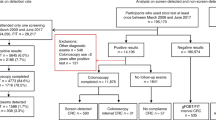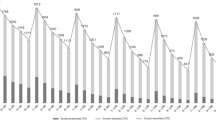Abstract
Two faecal occult blood tests (FOBTs), Hemoccult II (guaiac based) and Hemeselect (immunochemical) were compared in a population screening for colorectal cancer on 24 282 subjects aged 40-70. Hemeselect was interpreted according to a lower (+ and +/-) and a higher (+) positivity threshold. A total of 8008 compliers were enrolled in the study. Positivity rates: Hemoccult = 6.0%, Hemeselect (+ and +/) = 8.2%, Hemeselect (+) = 3.1%. Among FOBT-positive subject complying with the diagnostic work-up, 22 had colorectal cancer (17 Hemeselect-positive (+), four Hemeselect-borderline (+/-), 15 Hemoccult-positive) and 166 subjects had adenomas (62 Hemeselect(+), 56 Hemeselect-borderline (+/-), 79 Hemoccult-positive) were detected. The positive predictive values (PPVs) for cancer were as follows: Hemoccult = 3.7%, Hemeselect (+ and +/-) = 3.8%, Hemeselect (+) = 8.4%. The PPVs for adenoma(s) were: Hemoccult = 19.7%, Hemeselect (+ and +/-) = 21.4%, Hemeselect (+) = 30.5%. The specificity for cancer was: Hemoccult = 94.1%, Hemeselect (+ +/-) = 92%, Hemeselect (+) = 97.1%. Ratios between detection rates of each test and expected incidence of colorectal cancer suggest that Hemoccult anticipates cancer diagnosis by approximately 2 years on average whereas the mean diagnostic anticipation of Hemeselect ranges between 2.5 and 3.2 years. Hemeselect is superior to Hemoccult as it is at least as effective but more efficient and acceptable than guaiac testing. Further evaluation of Hemeselect cost-effectiveness and sensitivity is needed in order to assess the optimal threshold of positivity and screening frequency.
This is a preview of subscription content, access via your institution
Access options
Subscribe to this journal
Receive 24 print issues and online access
$259.00 per year
only $10.79 per issue
Buy this article
- Purchase on Springer Link
- Instant access to full article PDF
Prices may be subject to local taxes which are calculated during checkout
Similar content being viewed by others
Author information
Authors and Affiliations
Rights and permissions
About this article
Cite this article
Castiglione, G., Zappa, M., Grazzini, G. et al. Immunochemical vs guaiac faecal occult blood tests in a population-based screening programme for colorectal cancer. Br J Cancer 74, 141–144 (1996). https://doi.org/10.1038/bjc.1996.329
Issue Date:
DOI: https://doi.org/10.1038/bjc.1996.329
This article is cited by
-
Contribution of the OC Sensor® immunoassay in comparison to the Hemoccult II® guaiac-test in organized colorectal cancer screening
European Journal of Epidemiology (2019)
-
CT colonography: role in FOBT-based screening programs for colorectal cancer
Clinical Journal of Gastroenterology (2017)
-
Annual Fecal Occult Blood Testing can be Safely Suspended for up to 5 Years After a Negative Colonoscopy in Asymptomatic Average-Risk Patients
American Journal of Gastroenterology (2015)
-
A two-stage Bayesian method for estimating accuracy and disease prevalence for two dependent dichotomous screening tests when the status of individuals who are negative on both tests is unverified
BMC Medical Research Methodology (2014)
-
Comparison of Guaiac-Based and Quantitative Immunochemical Fecal Occult Blood Testing in a Population at Average Risk Undergoing Colorectal Cancer Screening
American Journal of Gastroenterology (2010)



